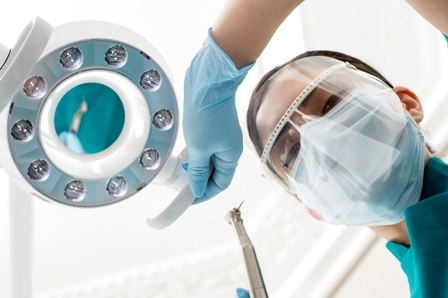Get Clarity on Obtaining Coverage For Dental Procedures Through Medicare

If you are looking at obtaining coverage for dental procedures through Medicare, chances are high that you will receive a denial. You should be aware of situations when Medicare will provide coverage for dental services and when it will not.
Background: If your patient is covered through Medicare, it is most likely that you will not receive any coverage through Medicare for performing any dental related procedures. But there are few situations wherein you can receive coverage for dental procedures especially when they are performed secondary to another covered procedure.
Know When Dental Procedures are not a Covered Service
In most circumstances, a dental procedure will not be covered through a medical insurance, especially Medicare. According to CMS, a dental procedure will not be covered service when they are performed in the following manner:
You will not receive any coverage from Medicare if your surgeon performs a dental procedure as a primary service in the care, treatment, removal, or replacement of teeth or structures directly supporting teeth. Note that the structures directly supporting the teeth are the periodontium, which includes the gingivae, dentogingival junction, periodontal membrane, cementum of the teeth, and the alveolar bone (i.e., alveolar process and tooth sockets). So, any procedure performed directly involving any of these support structures as a primary procedure will also receive no coverage from Medicare.
Example: If your oral surgeon removed a patient’s teeth or performed augmentation or a reshaping of the alveolar ridge to prepare the mouth for dentures, you cannot expect to receive any coverage through medical insurance. Another instance would be where your surgeon performed a removal of the patient’s teeth that was infected you will not receive any coverage through Medicare.
CMS also states that “when an excluded service is the primary procedure involved, it is not covered regardless of its complexity or difficulty.” So, if the removal of the tooth is a surgical extraction such as what your clinician will do in case of an impacted third molar tooth, it still will not receive any coverage through Medicare.
Be Informed About Dental Services That Will Receive Coverage
Medicare will also not cover a secondary dental service that your clinician performed unless the procedure was performed incident-to another covered primary service that your surgeon performed to treat a non-dental condition. However, to receive coverage for the secondary dental service, it has to be performed at the same time as the covered primary service and by the same physician/dentist.
When a patient has been hospitalized to receive a dental procedure, the dentist’s service is covered under Part B, and the inpatient hospital services furnished are covered under Part A. The coverage is determined by what service your clinician provided and the anatomical structures involved rather than the value of the procedure performed or the necessity of the dental care. “There are 12 CPT® codes (21076-21089) that are covered services; two of which are applicable to oral and maxillofacial surgery, 21085 and 21076,” says Barry Shipman, DMD, clinical professor, University of Florida School of Dentistry, Hialeah Dental Center. “Both are prosthetic codes but could be done by an oral surgeon.”You should also note that Medicare makes payment for a covered dental procedure no matter where the service is performed. The patient being hospitalized or not has no direct bearing on the coverage or exclusion of a given dental procedure.
Example: You receive coverage when your clinician performed surgical excision of a cyst and the removal of a tooth. The removal of the tooth was necessary as it was closely associated with the cyst. You will also receive coverage when your clinician removes teeth prior to the patient receiving radiation treatment. In such a situation, the removal of the tooth will be covered.
Another example where you will receive coverage will be the removal of a torus palatinus (a bony protuberance in the hard palate). However, if the removal is performed secondary to preparing the mouth to receive dentures, then you will not receive any medical insurance coverage for this procedure.
Note: If the dental procedure that your clinician performs receives coverage, then any associated procedure that your clinician or any other physician or specialist performs such as imaging studies and the administration of anesthesia will also receive coverage. If the dental procedure is not covered, then these associated procedures will also not be covered. For instance, x-rays and anesthesia administration is covered when the procedure performed is the reduction of a jaw fracture, but it is not covered when your clinician performs extraction of teeth to prepare the mouth to receive dentures.
You can also receive reimbursement towards any services or supplies that are incident-to the covered dental procedure. For instance, the services of a dental technician or nurse who is under the direct supervision of the dentist or physician are covered if the services are included in the dentist’s or physician’s bill.
Append Appropriate Modifier for Non-covered Dental Service
If your clinician is performing a non-covered dental service, you will need to know the guidelines for submitting a claim to receive a denial so that the dental service can then be covered through a supplemental insurance.
So, when you are submitting a claim for a non-covered dental service to Medicare, you will need to append the modifier GY (Item or service statutorily excluded, does not meet the definition of any Medicare benefit or, for non-Medicare insurers, is not a contract benefit), so that you will receive a denial. Then you can raise a claim to be submitted to the supplemental insurance. “This is a sticky area” Shipman adds. “I believe that the GY modifier indicates that the procedure is STATUTORILY EXCLUDED and thus a Medicare recipient can be billed for the service directly.”
Additionally, CMS states that “the modifier “GY” must be appended to a service(s) when the item or service is included on a claim and is statutorily excluded or does not meet the definition of any Medicare benefit.”
Resources: For more information on obtaining coverage for dental procedures through Medicare, check out the CMS guidance manual at https://www.cms.gov/Regulations-and-Guidance/Guidance/Manuals/Downloads/bp102c15.pdf .




